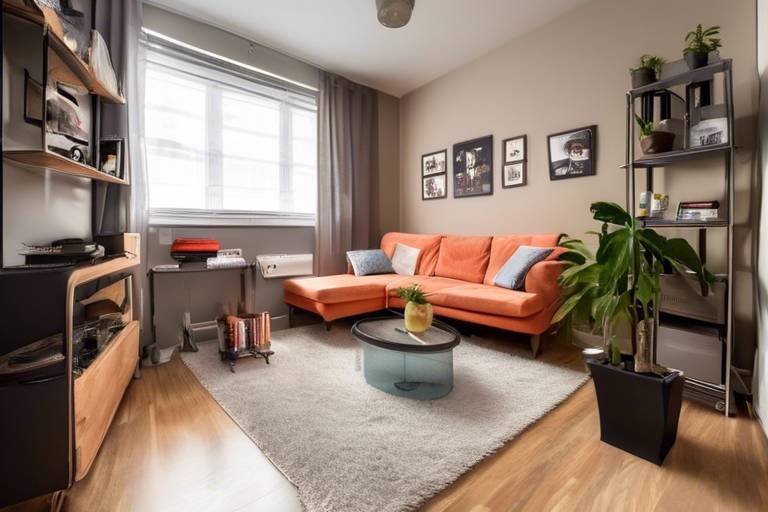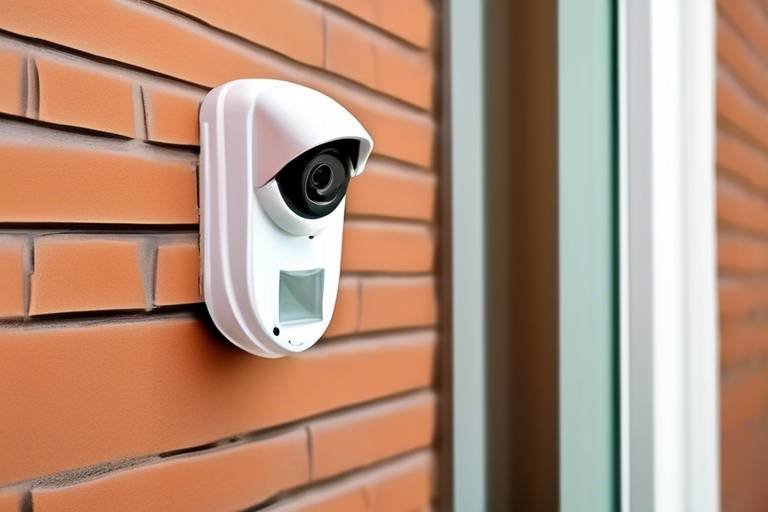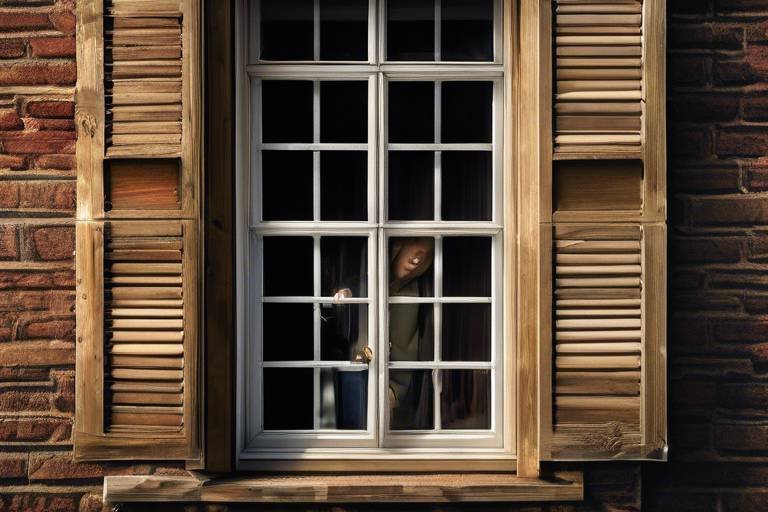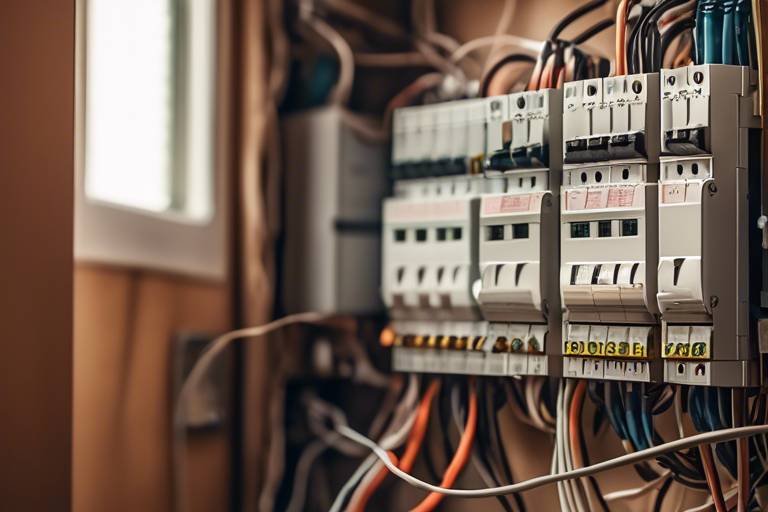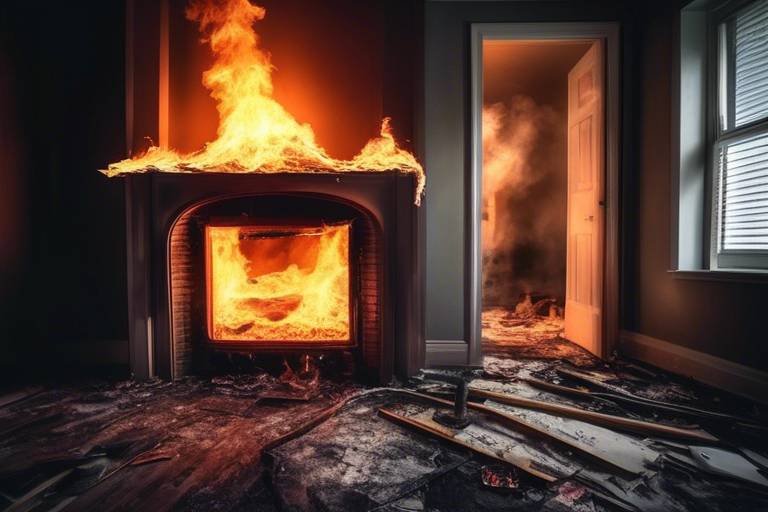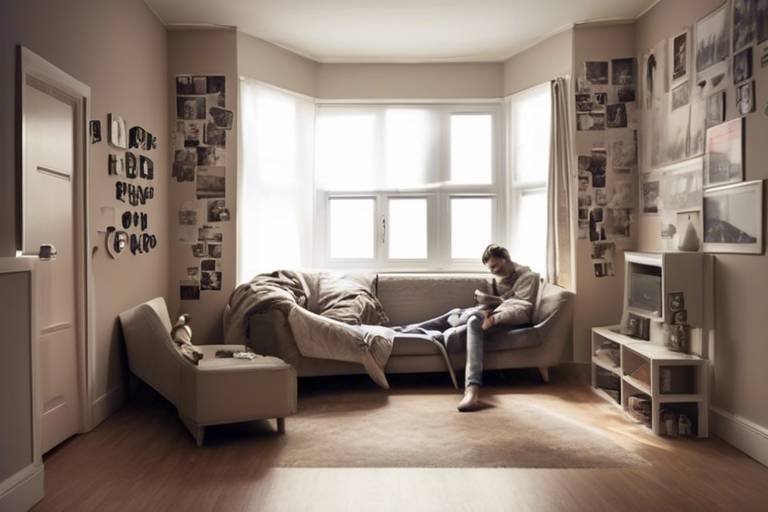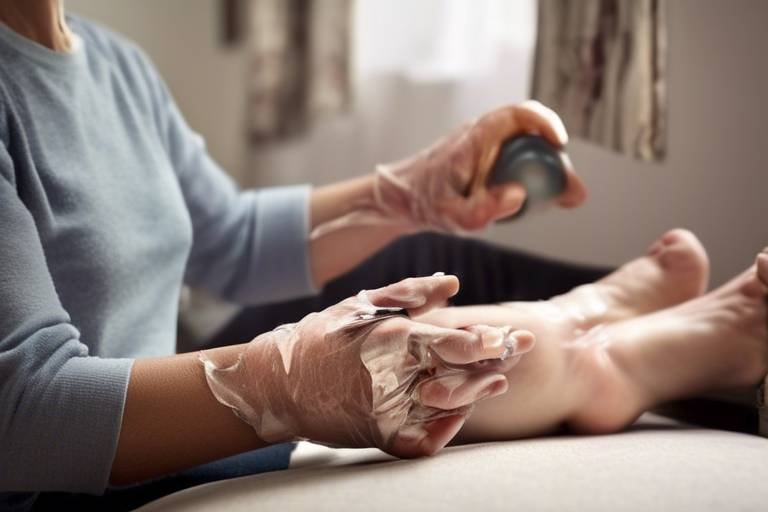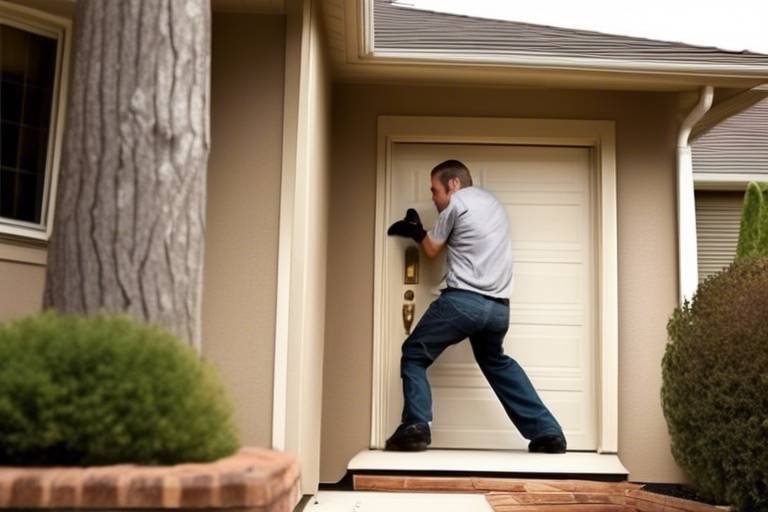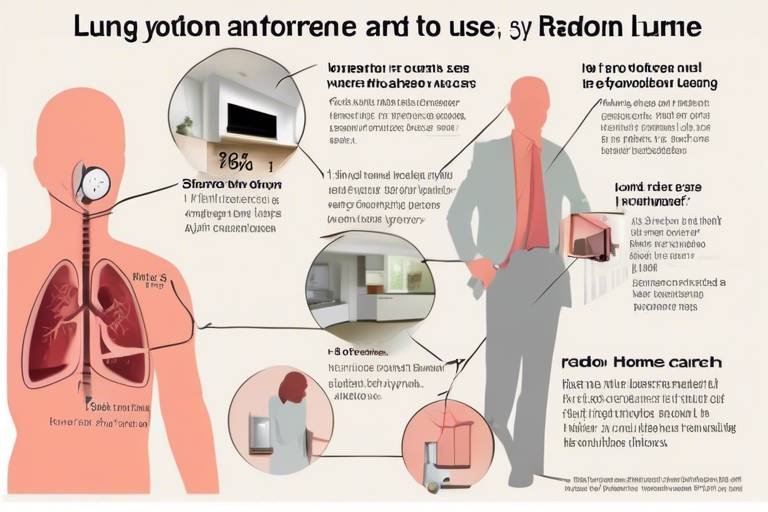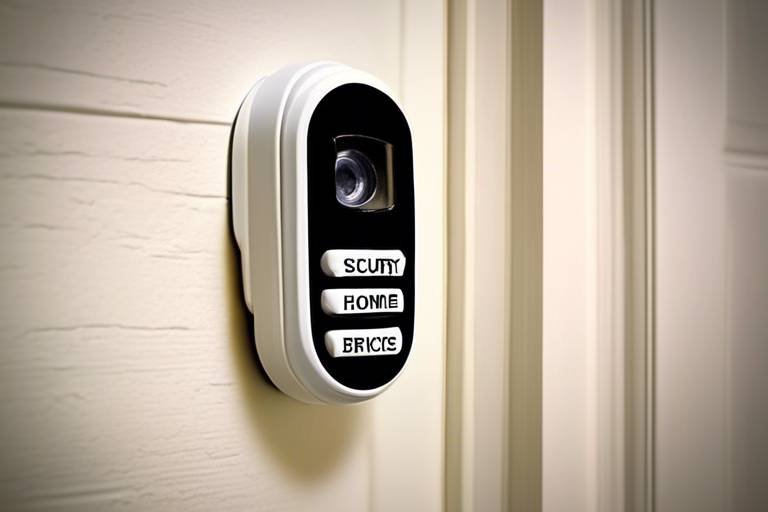How to Make Your Small Apartment Safe and Secure
Living in a small apartment can be a wonderful experience, but it often comes with its own set of challenges, especially when it comes to safety and security. The idea of someone breaking in can be unsettling, but the good news is that there are numerous practical steps you can take to enhance the safety of your living space. In this article, we will explore effective strategies that not only protect your belongings but also provide you with peace of mind. After all, feeling safe in your own home is a fundamental right that everyone deserves.
The first step in improving your apartment's security is to identify potential weak points. Think of your apartment as a fortress; if you don’t know where the cracks are, how can you fortify them? Start by walking through your space and taking note of areas that could be vulnerable. Are the doors sturdy? Are the windows easily accessible? Here are some key aspects to consider:
- Entry Points: Check all entry points, including doors and windows. Are they secure? Do they have adequate locks?
- Lighting: Is there enough lighting around your building and entryways? Poorly lit areas can provide cover for intruders.
- Neighborhood: Get to know your neighborhood. Are there any crime trends? Engaging with your community can provide insights into local safety issues.
By conducting a thorough assessment, you can pinpoint areas that need immediate attention and create a plan to address them.
The locks on your doors and windows are your first line of defense against intruders. Choosing the right locks is crucial for ensuring your apartment's security. With so many options available, it can be overwhelming. However, understanding the types of locks and their effectiveness can help you make informed decisions. Let’s dive into some of the most common lock types:
Deadbolts are often considered superior to standard locks due to their design. A standard lock is typically spring-loaded and can be easily manipulated, while a deadbolt requires a key or thumb turn to operate, providing an extra layer of security. When choosing locks for your doors, consider installing deadbolts for enhanced protection. They are particularly effective on exterior doors, where security is paramount.
In today’s digital age, smart locks have become increasingly popular. These locks offer convenience and advanced security features, such as remote access and monitoring through your smartphone. Imagine being able to lock or unlock your door from anywhere! Smart locks can also allow you to grant temporary access to friends or family without needing to hand over a physical key. Investing in a smart lock could be a game-changer for your apartment's security.
Windows are often overlooked when it comes to security, yet they can be an easy target for intruders. To reinforce your window security, consider installing window locks or security bars. Additionally, window film can make glass harder to break, adding an extra layer of protection. Remember, a determined intruder will look for the easiest way in, so making your windows more secure can deter them from choosing your apartment.
Creating a safe living environment goes beyond just physical security measures. It’s also about fostering a sense of community and awareness. Here are a few ways to create a secure atmosphere in your apartment:
- Organization: A clutter-free space not only looks better but also allows you to spot anything unusual more easily.
- Lighting: Use bright lighting in entryways and hallways to deter potential intruders.
- Neighborhood Awareness: Get to know your neighbors. A friendly community can keep an eye on each other’s homes.
By taking these steps, you can create an environment that feels safe and secure for you and your loved ones.
Investing in a security system can provide added peace of mind. With various types of security systems available for small apartments, it’s essential to understand their benefits and how they can fit into your lifestyle. From alarm systems to surveillance cameras, there are numerous options to consider.
Alarm systems are a popular choice for apartment dwellers. They can deter intruders and alert you to potential threats. When choosing an alarm system, consider one that offers 24/7 monitoring and integrates with your smartphone for real-time alerts. This way, you can be notified of any suspicious activity, even when you’re not home.
Surveillance cameras can significantly enhance your apartment's security. They provide visual evidence of any suspicious activity and can act as a deterrent to would-be intruders. When installing cameras, think about strategic locations such as entryways and common areas. Modern cameras often come equipped with motion detection and night vision, making them a reliable option for around-the-clock surveillance.
Engaging with your neighbors can significantly improve safety in your community. Establishing a neighborhood watch is a proactive way to enhance security. By working together, you can share information about suspicious activities and create a safer environment for everyone. Organize meetings, set up a communication channel, and encourage everyone to look out for one another. Remember, safety is a community effort!
Q: What is the best type of lock for my apartment?
A: Deadbolts are highly recommended for exterior doors as they provide an extra layer of security compared to standard locks.
Q: Are smart locks worth the investment?
A: Yes, smart locks offer convenience and advanced features that can enhance your apartment's security significantly.
Q: How can I make my windows more secure?
A: Consider installing window locks, security bars, or window film to reinforce their security.
Q: What should I do if I notice suspicious activity in my neighborhood?
A: Report it to local authorities and inform your neighbors. It’s essential to stay vigilant and communicate with your community.

Assessing Your Apartment's Vulnerabilities
When it comes to ensuring the safety of your small apartment, the first step is to identify potential weak points in your security. Think of your apartment as a fortress; if you don’t know where the cracks are, how can you reinforce them? Start by walking through your space with a critical eye. Look at each entry point—doors, windows, and even less obvious access points like balconies or basement doors. Are your locks sturdy? Are your windows easily opened from the outside? These are the questions you need to ask yourself.
Begin your assessment at the entrances. Front doors should have high-quality locks, ideally deadbolts, which provide an extra layer of security. If you have a sliding glass door, consider adding a security bar or a dowel in the track to prevent it from being forced open. Don't forget about your windows; they can be a major vulnerability if they’re not properly secured. Ensure all windows have functioning locks, and consider adding window security film for an extra layer of protection.
Next, evaluate the lighting around your apartment. Poorly lit areas can be inviting to intruders. Make sure your entryways are well-lit, and consider installing motion-sensor lights in dark corners. Not only will this deter potential intruders, but it will also make you feel safer when coming home at night. Think of lighting as your first line of defense, illuminating any potential threats before they can approach.
Another crucial aspect to assess is your surroundings. Pay attention to your neighborhood. Are there any areas that seem sketchy or poorly maintained? A well-kept neighborhood often has a lower crime rate. Engaging with your neighbors can also provide insights into local safety concerns. You might discover that your neighbors have already taken steps to enhance their security, and you can learn from their experiences.
Lastly, consider the technology available to you. Smart home devices can significantly enhance your apartment's security. From smart locks to video doorbells, these gadgets can provide real-time alerts and allow you to monitor your home remotely. During your assessment, think about how you can incorporate these technologies into your security strategy to create a more comprehensive safety net.
In summary, assessing your apartment’s vulnerabilities involves a thorough examination of physical security measures, environmental factors, and the potential benefits of technology. By taking the time to identify these weak points, you can develop a tailored security plan that meets your specific needs, ensuring peace of mind for you and your loved ones.
- What should I do if I find a weak point in my apartment's security?
Address it immediately by reinforcing locks, adding security devices, or consulting a professional for advice.
- How often should I reassess my apartment's security?
It's a good idea to reassess your security every six months or after any significant changes, such as new roommates or renovations.
- Are smart home devices worth the investment?
Yes, they can provide convenience and peace of mind, allowing you to monitor your apartment from anywhere.

Choosing the Right Locks
When it comes to securing your small apartment, the locks you choose are absolutely crucial. Think of them as the guardians of your home, standing watch against any unwanted intruders. With so many options available, how do you know which locks are the best for your apartment? It’s important to consider not just the type of lock, but also its quality and the specific needs of your living space. For instance, if you live on the ground floor or in a densely populated area, you might want to opt for more robust locking mechanisms.
First off, let’s break down the types of locks you might encounter:
- Standard Locks: These are the most common locks found on residential doors. While they can be effective, they often don’t provide the highest level of security.
- Deadbolts: Deadbolts are a step up from standard locks, offering a much stronger barrier. They come in single and double-cylinder versions, providing options based on your specific door type and security needs.
- Smart Locks: In our tech-savvy world, smart locks are gaining popularity. They allow you to control access through your smartphone, which can be incredibly convenient and secure.
Understanding the differences between these locks will help you make an informed decision. For example, deadbolts are generally considered more secure than standard locks because they require a key to retract the bolt. This means that even if someone picks the lock, they won’t be able to open the door without the key. However, not all deadbolts are created equal; it’s essential to look for those that meet industry standards, such as the ANSI (American National Standards Institute) grading system. A Grade 1 deadbolt, for instance, is the highest level of residential security.
Now, let’s talk about smart locks. These innovative devices not only provide convenience but also offer advanced features like remote locking and unlocking, temporary access codes for guests, and activity logs that show who entered and exited your apartment and when. Imagine being able to let a friend in while you’re at work, or knowing exactly when your kids come home from school. Smart locks can provide that peace of mind.
But wait, there’s more! Don’t forget about your windows. Many people focus solely on door locks, but windows can be an easy target for intruders. Consider adding window locks or even security bars for extra protection. Reinforcing your window security can be as simple as installing a window pin lock, which prevents the window from being opened further than a few inches. This simple addition can make a world of difference in your apartment’s overall security.
In conclusion, choosing the right locks for your apartment is not just about picking something that looks nice; it’s about selecting the best defense against potential threats. Take the time to evaluate your options, consider your lifestyle, and don’t hesitate to invest in quality locks that will give you the peace of mind you deserve. Remember, a well-secured home is a happy home!
Q: What type of lock is best for my apartment door?
A: A deadbolt is generally the best choice for apartment doors due to its enhanced security. Consider a Grade 1 deadbolt for maximum protection.
Q: Are smart locks safe?
A: Yes, smart locks can be very safe, especially those with features like two-factor authentication and encryption. Ensure you choose a reputable brand and keep your software updated.
Q: How can I secure my windows effectively?
A: Installing window locks, using window security film, or adding security bars can significantly enhance window security.

Deadbolts vs. Standard Locks
When it comes to securing your small apartment, one of the most important decisions you'll make is choosing the right type of lock for your doors. You might be wondering, "What’s the difference between deadbolts and standard locks, and which one should I choose?" Well, let's break it down.
Standard locks, often referred to as spring bolt locks, are the common locks you see on most doors. They are relatively easy to install and operate, making them a popular choice for many homeowners. However, their simplicity can also be a downside. Standard locks can be picked or bumped with relative ease, which means they might not provide the level of security you need in today’s world.
On the other hand, deadbolts are designed to offer enhanced security. Unlike standard locks, deadbolts require a key or thumb turn to operate, and they feature a solid metal bolt that extends deep into the door frame. This makes them much harder to tamper with. In fact, deadbolts can significantly reduce the likelihood of forced entry, acting as a robust barrier against intruders.
To help you visualize the differences, here’s a quick comparison:
| Feature | Standard Locks | Deadbolts |
|---|---|---|
| Security Level | Low | High |
| Ease of Picking | Easy | Hard |
| Installation | Simple | Moderate |
| Cost | Lower | Higher |
While both types of locks have their merits, if you’re serious about security, investing in a good deadbolt is a no-brainer. Think of it this way: if your apartment is like a fortress, a deadbolt is the heavy gate that keeps the bad guys out, while a standard lock is more like a flimsy latch that might not hold up under pressure.
In conclusion, when upgrading your apartment's security, consider switching to deadbolts for your main entry points. They not only offer superior protection but also provide peace of mind, knowing that your home is better safeguarded against potential threats. Remember, it's always better to err on the side of caution when it comes to your safety!
- What is the best type of deadbolt? Look for a single-cylinder deadbolt with a grade 1 rating for maximum security.
- Can I install a deadbolt myself? Yes, many deadbolts come with installation kits and instructions, making it a DIY-friendly project!
- Are smart locks better than deadbolts? Smart locks can offer convenience and additional features, but a deadbolt should still be used for optimal security.

Smart Locks for Modern Security
In today's fast-paced world, security technology is evolving at lightning speed, and smart locks are leading the charge in modern apartment security. Imagine being able to unlock your door with just a tap on your smartphone or by using your voice! That's the kind of convenience smart locks provide. But it's not just about ease; these locks offer a plethora of features that can significantly enhance your apartment's security.
First off, let's talk about how smart locks work. Unlike traditional locks that rely on physical keys, smart locks can be controlled remotely through your smartphone, tablet, or even a smart home hub. This means you can lock or unlock your door from anywhere, whether you're at work, on vacation, or just lounging on your couch. Many smart locks also come with a keypad, allowing you to enter a unique code for access. This feature is particularly handy for guests or service providers, as you can grant temporary access without needing to hand over a physical key.
Now, you might be wondering, "Are smart locks really secure?" The short answer is yes, but like any technology, they come with their own set of considerations. Most smart locks use encryption to protect your data and prevent unauthorized access. However, it’s essential to choose a reputable brand and regularly update the lock's firmware to safeguard against potential vulnerabilities. Additionally, many smart locks come equipped with features such as auto-lock capabilities, which automatically secure your door after a preset time, ensuring you never leave your apartment vulnerable.
One of the standout features of smart locks is their ability to integrate with other smart home devices. For instance, if you have a smart security system or surveillance cameras, you can create a cohesive security network that alerts you to any suspicious activity. Imagine receiving a notification on your phone when someone tries to enter your apartment while you're away! This level of integration not only enhances your security but also provides you with peace of mind.
However, it’s crucial to consider the installation process. While some smart locks can be easily installed as a DIY project, others may require professional installation. If you're not particularly handy, it might be worth investing in expert help to ensure your smart lock is installed correctly and securely. Also, keep in mind that some smart locks require a constant power source, so you'll need to check if your door has the necessary wiring or if you prefer a battery-operated model, which can be just as effective.
In conclusion, smart locks are a fantastic option for enhancing the security of your small apartment. They offer a blend of convenience, technology, and enhanced safety that traditional locks simply can’t match. By investing in a smart lock, you’re not just upgrading your door; you’re stepping into the future of home security. So, why not take the plunge and explore the various options available? Your peace of mind is worth it!
- Are smart locks safe? Yes, when properly installed and maintained, smart locks offer a high level of security.
- What happens if the battery dies? Most smart locks have a backup key option or a way to recharge the battery temporarily.
- Can I control my smart lock remotely? Yes, you can lock and unlock your door from anywhere using a smartphone app.
- Do smart locks work with existing deadbolts? Many smart locks can be installed over existing deadbolts for added security.

Reinforcing Window Security
When it comes to apartment security, windows are often the weakest link. Many people overlook them, assuming that their doors are the only entry points that need attention. But let’s face it—most intruders are sneaky and will look for the easiest way in. So, how can you reinforce your window security and make it a fortress? Here are some effective strategies that will not only bolster your defenses but also give you peace of mind.
First, consider installing window locks. Standard window locks are a good start, but they can often be easily bypassed. Upgrading to more robust locks, like sash locks or keyed locks, can provide an extra layer of security. These locks are designed to be more difficult to manipulate and can deter potential intruders. If you have sliding windows, ensure they have a lock that secures the window in place, preventing it from being opened from the outside.
Next, think about adding security film to your windows. This is a clear, adhesive film that strengthens the glass and makes it harder to break. In the event of an attempted break-in, the film will hold the glass together, making it much more challenging for an intruder to gain entry. Not only does this provide added security, but it can also protect you from accidents like flying debris during a storm.
Another method to consider is installing window bars or grilles. While they might sound like something out of a prison movie, modern designs can be quite attractive and still effective. They serve as a physical barrier that can deter intruders from attempting to break in. Just make sure that they comply with local fire codes and can be easily opened from the inside in case of an emergency.
Don’t forget about your window treatments! Thick curtains or blinds can obscure the view into your apartment, making it harder for potential intruders to see your belongings. When they can’t see what’s inside, they’re less likely to target your home. Plus, they offer a bit of privacy, which is always a bonus.
Lastly, consider the power of outdoor lighting. Installing motion-sensor lights near your windows can be a game changer. If someone approaches your window, the sudden burst of light can startle them and deter them from attempting to break in. It's like having a personal security guard that shines a spotlight on any suspicious activity!
In summary, reinforcing your window security is about being proactive. By implementing these strategies, you can turn your windows from a potential vulnerability into a strong point of defense. So, take a moment to assess your windows and consider what improvements you can make. Remember, a secure apartment is a happy apartment!
- What are the best types of locks for windows? - Sash locks and keyed locks are highly recommended for their effectiveness against break-ins.
- How does security film work? - Security film strengthens glass and holds it together, making it harder to break.
- Are window bars necessary? - While not essential, they provide an additional layer of security, especially in ground-floor apartments.
- Can outdoor lighting really deter intruders? - Yes! Motion-sensor lights can startle intruders and make them think twice about approaching your home.

Creating a Safe Environment
Creating a safe environment in your small apartment goes well beyond just installing locks and security systems. It’s about fostering a sense of security that permeates every corner of your living space. Think of your apartment as a cozy fortress—one that not only protects you but also makes you feel at ease. So, how can you transform your apartment into a sanctuary of safety? Let’s dive in!
First and foremost, consider the layout and organization of your apartment. A cluttered space can create hiding spots for unwanted guests and make it harder for you to react in case of an emergency. Regularly decluttering your living area not only enhances your apartment's aesthetic but also improves your overall safety. Imagine trying to find your keys in a chaotic mess when you're rushing out—stressful, right? Keep things tidy and organized to ensure you can easily navigate your home.
Next, lighting plays a pivotal role in creating a secure atmosphere. Bright, well-lit areas deter potential intruders, making it less appealing for them to target your apartment. Consider installing motion sensor lights in entryways and hallways. These lights will not only illuminate your path when you arrive home at night but also startle any suspicious individuals lurking around. Plus, who doesn’t enjoy the warm glow of a well-lit space? It adds a cozy vibe while keeping you safe.
Another essential aspect is being aware of your surroundings. Take the time to familiarize yourself with your neighborhood. This means not just knowing the faces of your neighbors but also being conscious of any unusual activities. If you notice something out of the ordinary, don’t hesitate to report it. Engaging with your community can create a network of vigilance that enhances everyone's safety. After all, safety is a shared responsibility. Have you ever thought about how a simple wave or chat with your neighbor can foster a more secure environment?
Lastly, consider incorporating some basic safety measures that might seem trivial but can significantly impact your overall security. For instance, always lock your doors and windows when you leave, even if you’re just stepping out for a moment. Additionally, invest in some simple security devices, like door wedges or window locks, which can serve as an extra layer of protection. You can think of these items as the cherry on top of your safety sundae—small but effective enhancements that make a difference.
In summary, creating a safe environment in your small apartment involves a combination of organization, lighting, neighborhood awareness, and basic security measures. By taking these steps, you can transform your living space into a haven where you feel secure and at ease. Remember, a safe home is a happy home!
- How can I improve my apartment's security on a budget? You can enhance your security by investing in affordable locks, using motion sensor lights, and maintaining good organization in your space.
- What are some signs that my neighborhood is unsafe? Look out for unusual activity, a lack of community engagement, or frequent disturbances. If you notice these signs, it may be time to connect with your neighbors.
- Is it worth it to install a security system in a small apartment? Absolutely! A security system can provide peace of mind, deter intruders, and alert you to potential threats, making it a worthwhile investment.

Utilizing Security Systems
When it comes to enhancing the safety of your small apartment, investing in a security system can be a game changer. Imagine having that extra layer of protection, where you can sleep soundly at night, knowing that your home is being monitored. Security systems come in various forms, each designed to cater to different needs and preferences. Whether you're a tech-savvy individual or someone who prefers traditional methods, there's a solution out there for you.
One of the primary benefits of a security system is the peace of mind it provides. You no longer have to worry about leaving home for work or vacation, as many modern systems offer remote monitoring capabilities. This means you can check in on your apartment from your smartphone, no matter where you are. Isn't that a comforting thought? Moreover, having a visible security system can deter potential intruders. Just the sight of a security camera or an alarm system can make a burglar think twice before attempting to break in.
Now, let's dive into the types of security systems available for small apartments. Here are a few popular options:
- Alarm Systems: These systems are designed to alert you and your neighbors in case of unauthorized access. They can range from simple door alarms to sophisticated systems connected to emergency services.
- Surveillance Cameras: Cameras can be placed strategically around your apartment to monitor activity. Some even come with motion detection and night vision capabilities, ensuring you're covered at all hours.
- Smart Home Security: These systems integrate with your smart devices, allowing you to control locks, cameras, and alarms from your smartphone or tablet. They offer convenience and flexibility that traditional systems may lack.
When choosing a security system, consider factors such as your budget, the layout of your apartment, and your lifestyle. For instance, if you travel frequently, a system that offers remote access and alerts might be ideal. On the other hand, if you're often at home, a simple alarm system might suffice. Additionally, many security companies provide packages that can be customized to fit your specific needs, making it easier to find the right fit.
It's also worth mentioning the importance of professional installation versus DIY options. While DIY systems can be more cost-effective, professional installation ensures that your security measures are set up correctly and efficiently. Think of it like assembling a complicated piece of furniture; sometimes, it’s best to leave it to the experts to avoid any headaches down the road.
In summary, utilizing a security system in your small apartment can significantly enhance your safety and peace of mind. By assessing your needs and exploring the various options available, you can find the perfect solution that fits your lifestyle and budget. Remember, investing in security is not just about protecting your belongings; it’s about safeguarding your sense of security and comfort in your own home.
Q: How much does a security system cost?
A: The cost of a security system can vary widely based on the type of system, features, and installation. Basic systems can start as low as $200, while more advanced setups can exceed $1,000.
Q: Do I need a monthly subscription for a security system?
A: Many security systems require a monthly subscription for monitoring services, but there are options available that do not require ongoing fees. Always check the terms before purchasing.
Q: Can I install a security system myself?
A: Yes, many modern security systems are designed for easy DIY installation. However, if you prefer a professional touch, many companies offer installation services for an additional fee.

Alarm Systems
When it comes to securing your small apartment, are a game changer. They act as a shield against potential intruders, providing you with a sense of safety that is hard to replicate. Imagine this: you’re at home, cozy on the couch, and suddenly, a loud alarm blares if someone tries to break in. That’s the power of a good alarm system! Not only do these systems alert you to unauthorized entries, but they also serve as a deterrent, making would-be burglars think twice before attempting to invade your personal space.
There are various types of alarm systems available, each with its own set of features and benefits. For instance, some systems are designed to be monitored 24/7 by a professional service, while others might be self-monitored through your smartphone. The key is to choose one that fits your lifestyle and security needs. Below is a quick comparison of the two main types:
| Type | Features | Pros | Cons |
|---|---|---|---|
| Monitored Systems | 24/7 professional monitoring, quick response times | Peace of mind, immediate alerts to authorities | Monthly fees, potential contracts |
| Self-Monitored Systems | Smartphone alerts, customizable settings | No monthly fees, complete control | Delayed response time, requires user action |
When selecting an alarm system, consider factors such as your budget, the size of your apartment, and your level of comfort with technology. If you're not particularly tech-savvy, a simpler system with easy-to-use features might be ideal. On the other hand, if you love gadgets, investing in a smart alarm system that integrates with your other smart home devices could be a thrilling choice.
Another important aspect to think about is the placement of alarm sensors. For maximum effectiveness, ensure that sensors are installed at all entry points, including doors and windows. You might also want to consider motion detectors in common areas, which can provide an additional layer of security. The strategic placement of these devices can make a significant difference in how well your alarm system functions.
Lastly, don't forget about the importance of regular maintenance for your alarm system. Just like any other appliance in your home, keeping your alarm system in top shape ensures it works when you need it most. Regularly check the batteries, test the system, and update your contact information with the monitoring service to ensure that help is just a call away.
- How do I know which alarm system is right for me? Consider your budget, the size of your apartment, and whether you prefer professional monitoring or self-monitoring.
- Can I install an alarm system myself? Many self-monitored systems are designed for easy DIY installation, while monitored systems often require professional setup.
- What happens if the alarm goes off accidentally? Most systems allow you to set a code to disarm the alarm quickly. Just make sure to inform your monitoring service to avoid unnecessary police dispatches.

Surveillance Cameras
When it comes to enhancing your apartment's security, can be a game-changer. They not only act as a deterrent to potential intruders but also provide you with a way to monitor your living space when you're not around. Imagine being able to check in on your home from anywhere in the world, all thanks to a few strategically placed cameras. It’s like having a virtual guardian watching over your belongings!
There are various types of surveillance cameras available, each with its own set of features tailored to different needs. For instance, indoor cameras are perfect for monitoring your living room or hallway, while outdoor cameras can keep an eye on your entrance or balcony. Some cameras come equipped with night vision capabilities, allowing you to see clearly even in low light conditions. Additionally, many modern cameras offer smart features such as motion detection, which alerts you via your smartphone if any unusual activity is detected.
When deciding on the best locations to install your cameras, consider the following:
- Entry Points: Place cameras at all entrances, including doors and windows, to capture any suspicious activity as it happens.
- Common Areas: Position cameras in shared spaces like the living room or hallway for comprehensive coverage.
- Blind Spots: Identify areas that are not easily visible from your main living space and install cameras there to eliminate vulnerabilities.
Additionally, the installation of these cameras can be quite simple, especially with the advent of wireless technology. Many cameras can be set up without any complicated wiring, allowing you to easily reposition them as needed. Just ensure that they are within range of your Wi-Fi network for optimal performance.
Moreover, consider the storage options for your surveillance footage. Some cameras offer cloud storage, which can be accessed remotely, while others may use local storage methods like SD cards. Each option has its benefits, so it's essential to choose one that aligns with your needs and budget.
In summary, incorporating surveillance cameras into your apartment security plan not only enhances safety but also provides peace of mind. With the right setup, you can feel more secure in your home, knowing that you have a watchful eye keeping track of things while you go about your daily life.
- What are the best types of surveillance cameras for apartments? Indoor and outdoor cameras with night vision and motion detection features are highly recommended for apartment security.
- Do I need a permit to install surveillance cameras in my apartment? Generally, you do not need a permit for personal surveillance cameras, but it’s best to check with your landlord or local laws.
- How can I access my surveillance footage remotely? Many modern cameras come with apps that allow you to view live footage and recorded clips from your smartphone or computer.

Establishing a Neighborhood Watch
When it comes to enhancing the safety of your small apartment, one of the most effective strategies is to engage with your neighbors and establish a Neighborhood Watch program. Think of it as a community shield—when everyone looks out for each other, the collective vigilance makes it much harder for any wrongdoing to occur. But how do you go about setting this up? It’s simpler than you might think!
First, gather your neighbors for an informal meeting. This can be over coffee or even a weekend barbecue. The goal is to foster a sense of community and discuss the importance of safety. During this meeting, you can share your concerns and encourage others to voice theirs. This creates an open dialogue and helps everyone feel invested in the safety of the neighborhood. You might be surprised at how many people share your concerns!
Next, it’s crucial to establish clear communication channels. Consider creating a group chat or a social media group where everyone can report suspicious activities or share safety tips. This can be as simple as a WhatsApp group or a Facebook page dedicated to neighborhood safety. The more accessible the communication, the more likely people will participate actively. After all, a vigilant community is a safe community!
Moreover, it’s essential to create a plan for regular check-ins and neighborhood patrols. You might want to set up a schedule where volunteers take turns walking around the neighborhood during different times of the day. This not only deters potential criminals but also builds camaraderie among neighbors. You can even create a Neighborhood Watch sign to post in your area, signaling that your community is united in safety.
Additionally, consider organizing safety workshops or inviting local law enforcement to speak at your meetings. They can provide valuable insights into crime prevention and personal safety tips. Knowledge is power, and arming yourselves with information can significantly reduce the chances of becoming a victim of crime.
In summary, establishing a Neighborhood Watch program is about creating a supportive network where everyone looks out for one another. It’s about transforming your neighborhood into a fortress of safety through collaboration and communication. So, gather your neighbors, start the conversation, and take the first step towards a more secure living environment!
- What is a Neighborhood Watch? A Neighborhood Watch is a community-driven initiative where residents come together to monitor and report suspicious activities in their area.
- How do I start a Neighborhood Watch? Begin by gathering interested neighbors, discussing safety concerns, and establishing communication channels.
- Does a Neighborhood Watch actually reduce crime? Yes, studies have shown that active Neighborhood Watch programs can lead to a decrease in crime rates.
- What should we do if we see suspicious activity? Report it to local law enforcement immediately and inform your Neighborhood Watch group.
Frequently Asked Questions
- What are the most common vulnerabilities in small apartments?
Common vulnerabilities in small apartments include weak door locks, unreinforced windows, poor lighting in entryways, and lack of a security system. It's essential to assess your apartment thoroughly to identify these weak points and take necessary measures to enhance security.
- How do I choose the best locks for my apartment?
When selecting locks, consider the type of lock (deadbolts are generally more secure than standard locks), the material of your doors, and the level of security you need. Smart locks are also a great option for added convenience and advanced features. Always opt for high-quality locks that meet safety standards.
- Are alarm systems worth the investment?
Absolutely! Alarm systems can significantly deter intruders and provide peace of mind. Many modern systems offer features like remote monitoring, alerts to your smartphone, and integration with other smart home devices, making them a worthwhile investment for your safety.
- How can I reinforce my window security?
To enhance window security, consider installing window locks, using security film, or adding window bars. Additionally, ensure that your windows are made of sturdy materials and are kept locked when not in use. Simple changes can make a big difference in preventing unauthorized entry.
- What are the benefits of establishing a neighborhood watch?
Establishing a neighborhood watch fosters a sense of community and enhances safety. It encourages neighbors to look out for one another, share information about suspicious activities, and work together to create a safer living environment. Plus, it can help build friendships and strengthen community ties!
- How do I choose the right surveillance camera for my apartment?
When selecting a surveillance camera, consider factors such as resolution, field of view, and whether you want a wired or wireless option. Look for cameras with night vision and motion detection features for added security. Placement is also crucial—install cameras at entry points and common areas for maximum effectiveness.

